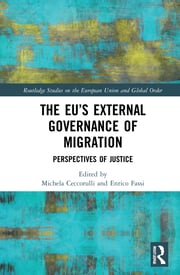Not its own man: The EU, West African migration, and the justice question
 This chaper by Rahmane Idrissa has appeared in The EU’s External Governance of Migration: Perspectives of Justice, edited by Michela Ceccorulli and Enrico Fassi. The chapter analyses the European Union (EU) as an entity uniquely tailored to be put to the test of the GLOBUS criterion of global justice. The policy measures it developed regarding West African policy and especially the Economic Community of West African States (ECOWAS), Mali, Niger and Nigeria, are assessed in that regard. It is found that, while committing to the criterion’s principles of justice on paper, the EU’s measures overwhelmingly tended to violate them. Instead of recognizing the value of West Africans perspectives and objectives, it took measures that negated them in favour of expediency. This unjust outcome is shown to derive from the complex nature of the EU, which is a civilian, normative and derivative power. If its agency as a civilian and normative power does not inherently impair its commitment to principles of global justice, the restrictions it suffers as a derivative power strongly suggest that it cannot consistently uphold principles of justice.
This chaper by Rahmane Idrissa has appeared in The EU’s External Governance of Migration: Perspectives of Justice, edited by Michela Ceccorulli and Enrico Fassi. The chapter analyses the European Union (EU) as an entity uniquely tailored to be put to the test of the GLOBUS criterion of global justice. The policy measures it developed regarding West African policy and especially the Economic Community of West African States (ECOWAS), Mali, Niger and Nigeria, are assessed in that regard. It is found that, while committing to the criterion’s principles of justice on paper, the EU’s measures overwhelmingly tended to violate them. Instead of recognizing the value of West Africans perspectives and objectives, it took measures that negated them in favour of expediency. This unjust outcome is shown to derive from the complex nature of the EU, which is a civilian, normative and derivative power. If its agency as a civilian and normative power does not inherently impair its commitment to principles of global justice, the restrictions it suffers as a derivative power strongly suggest that it cannot consistently uphold principles of justice.
Pages 117-133. This book has been published by Routledge.
Author(s) / editor(s)
About the author(s) / editor(s)
Rahmane Idrissa is a senior researcher at the ASCL. His research expertise ranges from issues of states, institutions and democratisation in Africa to Salafi radicalism in the Sahel and current projects on the history of state formation in Africa, with a focus both on the modern (Niger) and premodern eras (Songhay).

